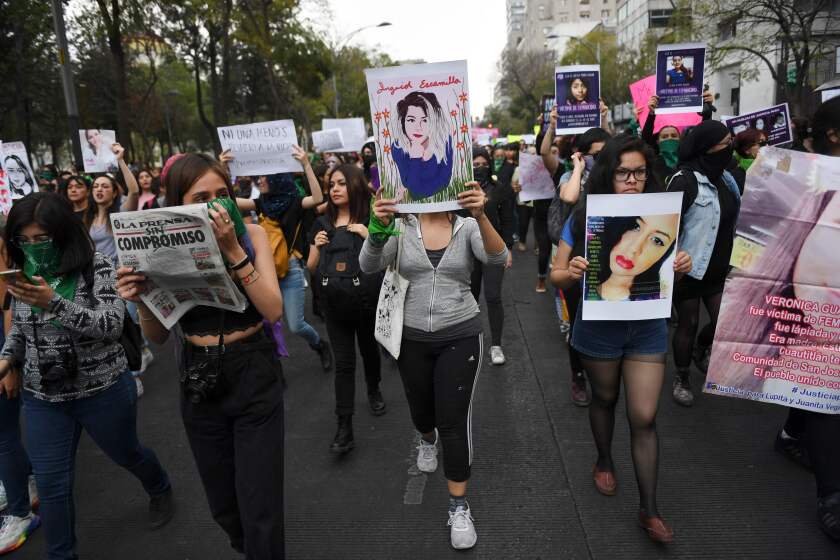Half-empty offices, schools and businesses: Mexico goes a day without women

- Share via
MEXICO CITY — Rush hour had the laid-back vibe of a Sunday morning.
Many shops were closed, offices were full of unoccupied desks, and schools had to make do without much of their staff or many students.
This was the curious panorama Monday across much of Mexico, as women took the day off in a widely anticipated protest.
The “national strike,” as organizers called it, was meant to raise consciousness about violence against women — and, more broadly, to push back against a culture that many say overlooks their daily contributions to society.
Activists in Mexico call for a national women’s strike to call attention to a rise in femicide, a term used for some homicides targeting women.
Women were urged to skip both paid employment and domestic chores at home. Many, if not most, seemed to go along.
“I decided not to go to work, not to leave my house, not to go shopping, as a protest against violence that women suffer,” said Brenda Hernández, 33, a supermarket manager in Mexico City. “This is a powerful message to society: If we continue doing nothing, tomorrow something could happen to your wife, to your daughter or mother.”
Throughout the day, photos of half-empty offices, shops and restaurants circulated on social media. On streets in downtown Mexico City, most of the workers heading out to lunch beneath sunny skies were male.
“The truth is it feels terrible that there are no women,” said Carlos Corral, 24, who works in a United Colors of Benetton emporium in a mall along Paseo de la Reforma, one of the capital’s major thoroughfares. “We miss our female colleagues and the plaza is mostly empty.”
The shopping center, known as Reforma 222, is itself infamous for a brutal attack on a woman. In March 2018, a shoe-store employee, 27, was shot and killed at work by her estranged husband.
Many business leaders and government officials backed Monday’s strike, promising that women skipping work would still be paid for the day.
In Mexico City, the heart of a metropolis of 20 million, traffic was light and it was easy to find seats on the normally packed underground metro. Most female ticket sellers seemed to have stayed home, so passage at many stations was free.
Tens of thousands of women marched in Mexico City
In some industries dominated by women, work essentially stopped.
Hotels posted signs saying rooms would not be cleaned because housekeepers were staying home. Some restaurants, beauty salons and other shops never opened.
At Las Golondrinas hotel in the southern city of Oaxaca, men changed sheets and cleaned bathrooms, tasks typically done by women.
“I’m for more equality, but I don’t believe in radical feminism,” said Félix Sánchez, 26, a hotel employee grudgingly pitching in.
At the Japón middle school in south Mexico City, only one girl showed up for classes at the normally bustling facility with an enrollment of 550, including 350 girls. Most female teachers also stayed home, leaving male teachers to organize gym classes and other activities for the boys.
“We’re doing the best we can, but most of the girls are happy to have a day of vacation,” said one male teacher, who refused to give his name.
“I support the women’s movement, but many female teachers took it as a day off and some planned long weekends,” he said. “Some are in Acapulco,” the Pacific coast resort town.
Not every woman could afford to take the day off, or had an employer’s blessing to do so.
“I would have gladly participated today, but as a single mother, I have to work so that my kids eat and go to school,” said Magda Rodríguez, a street vendor who has two teenage daughters and a 9-year-old son.
“To leave my work for a day is a luxury that I don’t know,” said Rodríguez, who wakes up at 3 a.m. daily to make tamales to sell in the capital’s San Mateo district. “Here there is no vacation. If one doesn’t work one doesn’t eat.”
Business was slow Monday, but Rodríguez said she was in solidarity with the growing awareness of the role of women in Mexican society.
“I am very happy that people are finally talking about these themes, about violence against women and the injustices that we face,” she said. “I have two daughters and I always worry about what might happen to them. I am in terror when it is nighttime and they haven’t returned home. What a good thing that women are defending themselves, that they are denouncing violent men.”
Monday’s protest — dubbed 9M, or March 9th — came a day after tens of thousands of women marched in cities throughout Mexico to denounce femicide, or homicide targeting women. This in a nation where officials say 10 women are killed each day, and assailants routinely go unpunished.
Recent slayings in Mexico City of a 7-year-old girl and a 25-year-old female office worker galvanized a growing movement seeking to curtail the violence.
Organizers said they hoped the strike would translate into concrete action, such as more robust police investigations and enhanced penalties for men who assault or kill female victims.
Jimena Soria, who works at an abortion rights organization that supported the strike, said the true test will be whether employers who let workers take off Monday will enact female-friendly policies, such as implementing equal wages for women.
“The commitment to women is not just about today,” she said. “It must go far beyond that.”
Meanwhile, in New York on Monday, a United Nations commission on women’s issues backed a women’s rights platform adopted by most countries at a 1995 women’s conference. The move comes as activists have warned that gender equality may be diminishing, not growing.
Organizers of the women’s strike here say they took their cue in part from previous “days without women” in various countries, including a 1975 action in Iceland, a protest in 2016 in Poland and the massive marches in Washington prompted by what critics called sexist behavior by President Trump.
McDonnell reported from Mexico City and Linthicum from Oaxaca. Special correspondent Sánchez reported from Mexico City.
More to Read
Sign up for Essential California
The most important California stories and recommendations in your inbox every morning.
You may occasionally receive promotional content from the Los Angeles Times.













